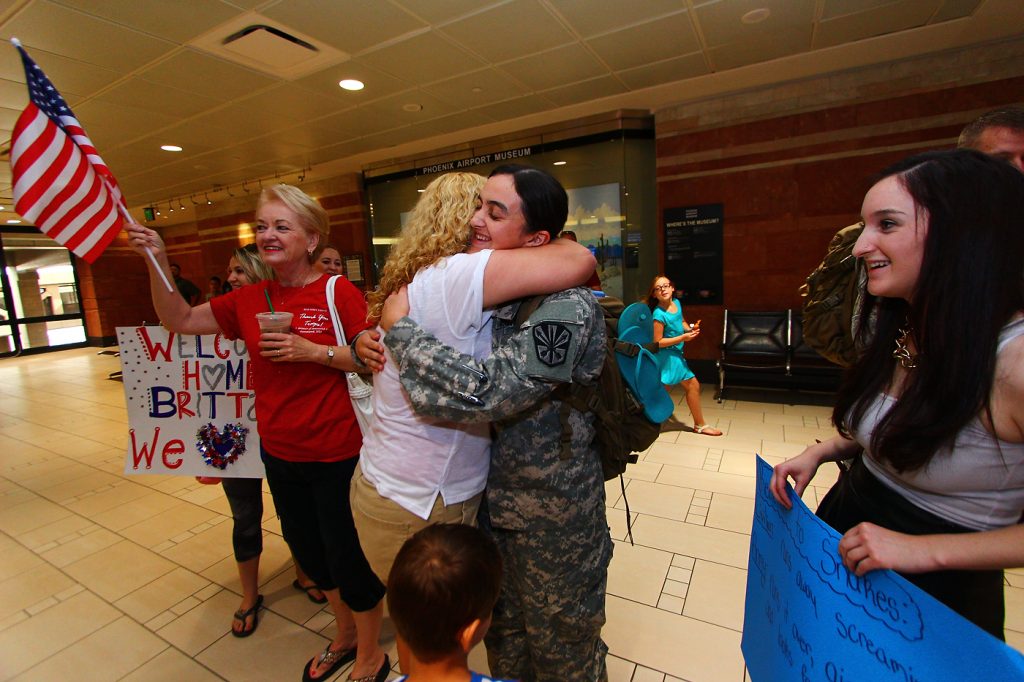
Dressed in fatigues and sporting backpacks, members of the Arizona Army National Guard’s 123 Mobile Public Affairs Detachment were finally headed for home. It was a recent Saturday morning, and they were mostly exhausted from the long journey.
Deployed at Guantanamo Bay, Cuba, since October 2014, the arriving soldiers were eager to step into the arms of the loved ones who awaited them at Sky Harbor International Airport, where a hot wind belied the monsoon thunderheads gathering on the horizon.
Like most such reunions, there was the usual assortment of American flags and colorful banners. A cheer erupted as the troops made their way toward the crowd, where they were greeted with red, white and blue balloons, applause and whistles. More than a few family members brushed back tears of joy—and relief.
Not everyone who stood at Checkpoint B inside Terminal 4 was awaiting a loved one, however. Twenty-something Jackie Martin, an anthropology and Spanish student at Arizona State University, wasn’t related to any of the returnees.
“I’m just here to welcome them home. As a volunteer with the USO, we just wanted to have a little celebration for their homecoming with their families and their coworkers, and have the American flags waiting for them.”
The United Service Organization originated during World War II as a way to provide emotional support to the millions of troops who battled the enemy and served their country. So what’s an ASU student doing at a USO event on a Saturday morning? Isn’t the USO, well, something older people do?
“My mom is actually the director of USO Arizona, so she got me into it,” Martin laughed. “I didn’t really know about it before then. I’ve been volunteering for about a year and I’m starting to recruit some of my friends. One of them just started. I’m trying to get the ASU crowd in here, too.”
The young greeter’s long, dark hair, held back by a lace headband, stood holding a small American flag and offered her thoughts on the troops’ arrival.
“They’re so humble about their service” she said. “They’re like, ‘Thank you guys, thank you for being here,’ but I think it’s really heartwarming for them to have a lot of people here, knowing they have so much support. It’s nice to come home to a bunch of smiling faces—even people they don’t know—who are thanking them for their service.”
Guys like Sgt. Robert Freese of Tempe, who admitted he was sleepy after the long flight and glad to be back in the Grand Canyon state. His mother, Kathy Love, was there with her fiancé, Mike Stevens, and Freese’s two nieces, 10-year-old Tylin and 9-year-old Jalani. Freese managed to hoist the girls to his hip for a photo.
“I’m so glad to be back and get to see my family,” Freese said. “I was born and raised in Arizona. I joined the National Guard to support my family.”
Serving at “Gitmo,” as the base has come to be known, “was a great mission,” Freese said. The detention camp is operated by Joint Task Force Guantanamo. Joint Task Force Guantanamo is a U.S. military joint task force based at Guantanamo Bay Naval Base, Guantánamo Bay, Cuba on the southestern end of the island. JTF-GTMO falls under U.S. Southern Command. Since January 2001 the command has operated the Guantanamo Bay detention camps Camp X-Ray and its successors Camp Delta, Camp V, and Camp Echo, where detained prisoners are held who have been captured in the war on Afghanistan and elsewhere since the Septemeber 11, 2001 attacks. The unit is currently under the command of Rear Admiral David B. Woods, who replaced Rear Admiral Jeffrey Harbeson in August 2011. Previous commanders have included Army Major General Geoffrey D. Miller, who took command in November 2002.
“What the Joint Task Force does is really important for our national security with the detention facility.”
Of course, not all the returning troops are men.
Amber Fogel, another ASU student, was there to welcome home her sister, Brittany. She’d taken the time to decorate a poster with red, silver and blue glitter and sparkly letters declaring “Welcome Home, Brittany!” What was her sister doing in Guantanamo Bay?
“She’s not allowed to tell us. She works with the press,” Fogel said. “She’s been gone since October, so I’m very excited and happy that she’s coming home today.” The sisters, including older sister Tiffany, have been keeping in touch via Facebook and through email, but admitted they missed Brittany. “We’re very proud of her and I’m glad that she got to get this experience in another country,” Tiffany said.
As for Freese, he’s happy to be back in Tempe, but said he enjoyed his time at Gitmo.
“I loved the weather and there’s a lot to do down there as far as outdoor stuff. Almost every weekend there’s something to do, 5-K runs, different athletic events. Then there’s diving, boating, fishing.”
Standing there with his family members, Freese takes in the scene of his fellow soldier streaming toward the baggage claim. “It’s great to be home.”


